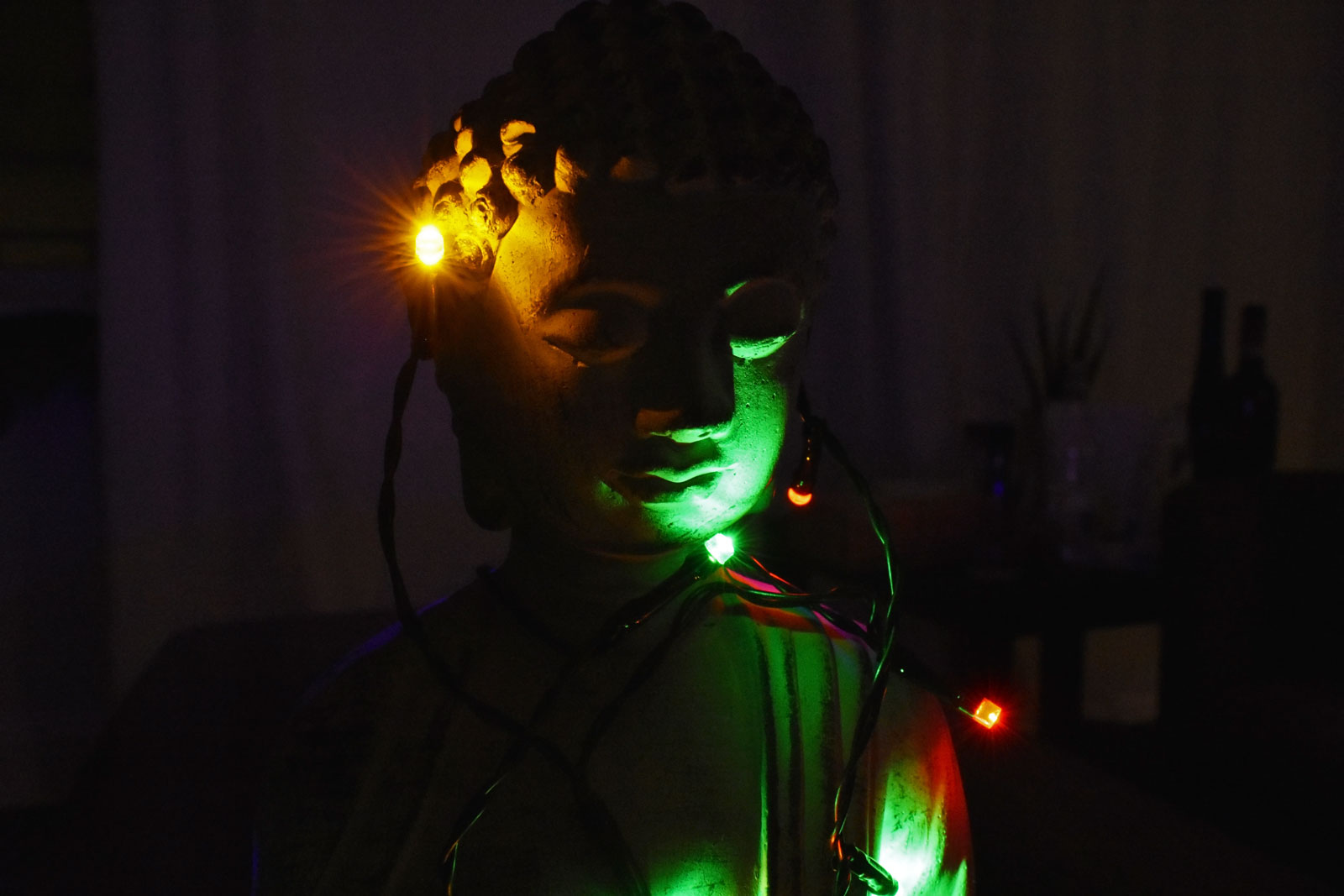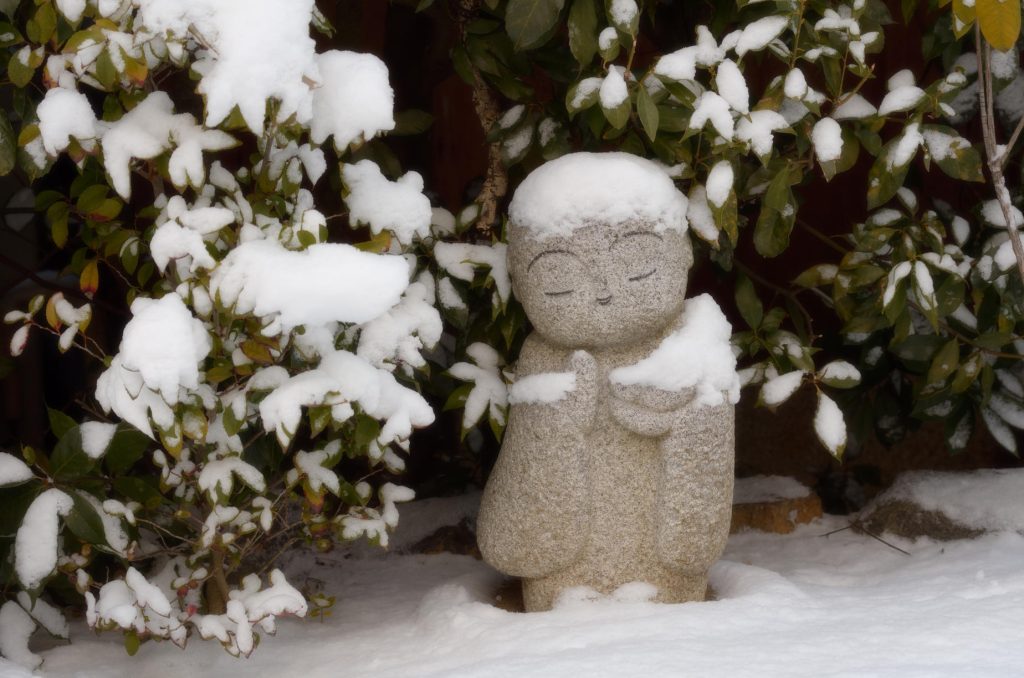Dear Readers,
This year has been incredibly eventful, both around the globe and here at Tricycle. With your support, we have redesigned the magazine with a fresh look and layout, prepared to launch our upcoming free online resource Buddhism for Beginners, and hosted a series of thought-provoking live events—all while continuing to cover the new and interesting ways that the dharma manifests in the modern world.
While life is often chaotic and confusing, we hope that Tricycle can serve as a refuge to help you not only take a break from the world but also return to it ready to face challenges with greater equanimity.
As 2018 comes to a close, we want to offer you our sincerest gratitude as we share our thoughts on what this year has meant to us and some of the lessons we’ve learned along the way.
Enjoy the holidays and happy new year!
Sincerely,
—The Tricycle staff
Julia Hirsch, Community Development Manager:
2018 has been a heavy hitter in more ways than one. In cities around the world, this year has been marked by countless acts of violence motivated by anger, fear, intolerance, and—the root of it all—ignorance. And personally, I’ve had to navigate the deep pain of losing a grandparent as well as the physical pain from an injury I sustained while playing pick-up soccer in Brooklyn (with a bunch of hot-headed men) that resulted in surgery and months of recovery. Trust me when I say that hobbling around the streets and subways of New York City on crutches is a great exercise in patience and humility.
But this summer I also had the wonderful privilege of representing Tricycle on a ten-day pilgrimage to Ladakh, India, where I got to reconnect with the living Tibetan Buddhist tradition in the Himalayas. Through these high highs and low lows, I’ve leaned on my Buddhist practice, especially the Buddha’s metaphor of dealing with hardship by working to remove the thorn lodged in our own minds and hearts. Here’s to a 2019 filled with less man-made suffering (and hobbling) and more intention, inner joy, and collective healing.
Matthew Abrahams, Web Editor:
At this time last year, I was working at a daily newspaper. They always needed people to work the holidays, and since I was (relatively) young and had no children, I drew the short straw. But this year is different. Instead of treating it as another day at work, just with a quieter commute, I’ll have a moment to stop and reflect with the rest of the country as people escape the public sphere to break off into intimate gatherings. The importance of that large-scale pause has become clearer to me this year. There’s a spiritual significance to it that no individual can recreate, even with most profound experience. The word spiritual has come to mean a lot of things, but what I’m thinking of here is how the philosopher G.W.F. Hegel used the term: for him, spirit meant (roughly) consciousness operating at the socio-historical level rather than the individual level. In this view, individual consciousnesses are constantly splitting off and being folded back into spirit as it marches forward. Buddhism, likewise, holds that we all share a common nature and that our individual selves are only a temporary expression of the ever-changing cosmos. When we all agree a time of the year is special, even if we don’t agree on why, we create an opportunity to connect with our place in (or alienation from) this larger whole in a visceral way. We feel the holiday spirit.
I’m grateful to be able to experience this massive spiritual event this year. I am not a member of a sangha [community], but working at Tricycle, with a dedicated crew of creative and curious Buddhists, I certainly feel connected to something. I know that, sitting on the other end of an invisible chain, there’s you, the reader. An article can feel like a shout into a void, but then you read it and I remember why we’re doing this. So at this time for pausing, I want to stop and say thank you. And happy holidays.
Wendy Joan Biddlecombe Algar, Audience Development Editor:
I’m feeling especially grateful for the teachings as 2018 comes to a close. December flew by, as it always does, but this year I managed to wake up early enough to sit every morning—even if it was just five minutes—and see a few incredible sunrises after the ending bell went off. Year by year, I seem to be chipping away at the holiday hysteria and the need to give perfectly meaningful gifts, and instead connecting, reconnecting, and creating something new during these dark days.

Danya Spencer, Online Course Manager:
2018 was a year of connection for me: moving home after years away and having the opportunity to reconnect with roots in New York, rekindle old friendships and drop in on family at a moment’s notice. There was a lot of warmth throughout the year. But as I look back, I also recall the many small and easily overlooked interactions shared with strangers: baristas, waiters, postal workers, receptionists, and fellow subway riders. These short and simple moments have brightened my day on so many occasions and continue to shift my perspective on the people I encounter every day—viewing them as fellow connection-seeking beings rather than threats to my individual self. Of course, these interactions can be positive and negative. They are brief moments of friction in which two people have a chance to catch a glimpse of their shared humanity. And I see them as vital opportunities for leaning in and opening to the world—as the dharma encourages. It’s my hope that these micro moments will only increase in the new year and that they find a way to touch each person, wherever they are.
Eliza Rockefeller, Editorial Assistant:
This holiday season I’m grateful for a year of change and growth. At this time last year, I had just finished my seasonal job in the White Mountains of New Hampshire and moved home to New York City, unsure what the future held and still learning how to navigate post-grad life. Like many of us, I found it difficult to make time for my practice and find meaning in the hustle and bustle of routine, especially in an urban center like New York City. I was lucky to find my way to Tricycle and join the close-knit team. Amid political upheaval and social unrest, as our values are threatened and the forces of repression have intensified, I think it’s more important than ever to cultivate the values of wisdom and compassion the Buddha taught and to engage with the teachings in our daily lives. I’m constantly learning from our contributors, from my coworkers, and from our readers. Thank you for making us a part of your life and sharing your thoughts. I hope you all have a chance to slow down, get some rest, reflect, and spend time with loved ones in these last few weeks of 2018. Happy holidays and happy new year!
Emma Varvaloucas, Executive Editor:
You might be familiar with the traditional Buddhist cosmology that we are currently living in a degenerate age. They mean, of course, in regard to the dharma, but it’s not hard to bring this narrative to the world and find supporting evidence for it—the prevailing mood of the country is bleak. Distrust of authority figures and institutions abounds. #MeToo has brought painful wounds to the surface, in ways that sometimes feel as traumatizing as they are healing.
This year I was fortunate to be invited to Korea by the Won Buddhist organization, a form of new Buddhism that presents an alternate cosmology: that we live in an age where scientific advancements and widespread education mean that it’s more and more difficult for the bad to stay hidden. In their view, it’s unavoidable that misconduct in all spheres—social, political, interpersonal—will be exposed to the light, propelling humanity forward.
For me, deciding which of these narratives is “true” is irrelevant. Instead, I’ve found the work of holding both of these cosmologies in my heart to be both meaningful and useful. We can actively choose whatever narrative we wish to live by. Why not choose persevering hope and inspiration, even in the face of darkness? This is the narrative I would wish for our all readers moving into 2019. May you, and everyone in this world, look straight into the suffering swirling around us, and be free.
Andrew Cooper, Features Editor:
At the end of a tumultuous year and the beginning of one that promises to be no less, er, eventful, I am thinking of how hard yet essential it is to find ways to give and receive support. In his song “Mississippi“, Bob Dylan gets right to the heart of it.
Stick with me, baby.
Stick with me anyhow.
Things should start to get interestin’ right about now.
Gabriel Lefferts, Managing Editor:
For some, formulating a New Year’s resolution can seem like a tacky thing to do. Caution, we remind ourselves with clenched teeth, must. not. be. that. self-absorbed. wellness. person. on. that. yoga. poster. And let’s be honest, even if we do make a resolution (if we’re willing to admit that part of us does strive to be a better person), most of them are forgotten by the end of January. So what’s the point?
In what I’ve experienced of Buddhist practice, a critical day-in and day-out component is aspiration. They can be grandiose— “I aspire to become enlightened in order to benefit all sentient beings.” Or they can be immediate—“I aspire to not let self-deprecation get in my way today.” The thing is, that simple act of aspiring, even if it’s forgotten a month, a week, or even 10 minutes later, has a powerful impact on who we are because it calibrates our karmic compasses. Each time we home in on the qualities of wisdom and compassion that we admire and respect in others, we create an imprint in our minds that is there for us when we encounter a challenge down the road. And that karmic imprint can begin to inform our actions, which over time and with repetition, can become better habits. The process might not be fast, easy, or guaranteed, but it’s possible—and it starts with aspiration.
So with that in mind, here’s to a hearty round of 2019 New Year’s aspirations, no matter how tacky they might seem.
Thank you for subscribing to Tricycle! As a nonprofit, we depend on readers like you to keep Buddhist teachings and practices widely available.
